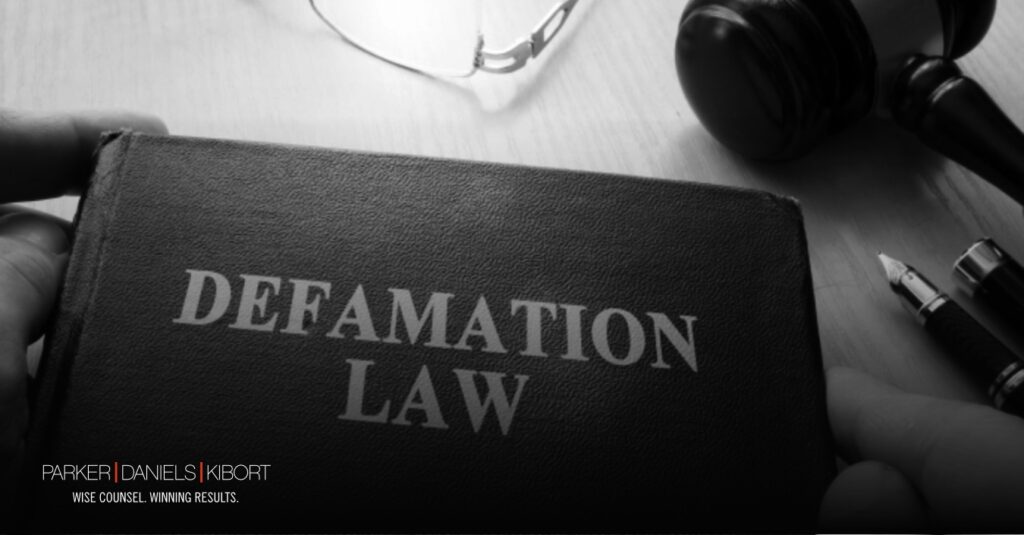
Reducing the Cost of Free Speech: Minnesota Revives a Tool for Dealing with Defamation Lawsuits
Politically active citizens and media occasionally find out the hard way that freedom to speak can be quite expensive, when they are sued for speaking out about controversial political issues. A defamation[1] lawsuit is nothing to sneeze at, even if the speaker expects to win because they do not believe they have said anything false. Legal fees and costs to defend in court add up quickly. Worse, there’s rarely a sure thing in litigation and damages can be difficult to quantify. Even a strong defense can take an unexpected turn.
Thus the problem of frivolous but expensive defamation lawsuits is worrisome. As of mid-2024, Minnesotans have a new-old legal tool for responding to these situations: Minn. Stat. §§ 554.07-554.19, the Minnesota Uniform Public Expression Protection Act.
The Act allows a person who is sued for certain kinds of speech to immediately bring a special motion to dismiss the lawsuit. All court proceedings are frozen until the special motion is ruled on, and the defendant is permitted, much earlier than court processes ordinarily allow, to present evidence. As a result, the defendant can potentially get the lawsuit dismissed without suffering the trouble and expense of full-blown court discovery, which is intrusive, slow, and costly. If the special motion is granted, the defendant is entitled to recover court costs, reasonable attorney fees, and reasonable litigation expenses related to the motion. If the motion is denied, there is a right to an immediate appeal – an exception from the ordinary rule requiring a defendant to wait to appeal until after completion of the whole case. All in all, the Act provides powerful procedural tools for defendants who meet its requirements.
There’s a story and a history behind the Uniform Public Expression Protection Act, which is why it’s fair to call the protection given by it “new-old.” In 1994 Minnesota enacted a similar law. However, the Minnesota Supreme Court found the 1994 law unconstitutional under the Minnesota Constitution because of the way the law impaired the right to trial by jury. Leiendecker v. Asian Women United of Minnesota, 895 N.W. 2d 623 (Minn. 2017). The legislation passed in 2024 is an effort to recover free speech protections granted by the 1994 law while avoiding the constitutional problem that doomed the predecessor.
Minnesota is not alone in passing legislation intended to shield free speech about public issues from defamation liability. More than half of other states and territories now have some kind of similar provision. Often these are called “anti-SLAPP” laws, where SLAPP stands for “strategic lawsuits against public participation.” The new Minnesota Uniform Public Expression Protection Act is based on work done by the Uniform Laws Commission analyzing anti-SLAPP laws from many states to identify what approaches work best.
What kinds of speech are protected by the Minnesota Uniform Public Expression Protection Act?
- Communication in a “governmental proceeding”
- Communication “on an issue under consideration” in a governmental proceeding
- Exercise of “the right of freedom of speech or of the press” that is “guaranteed by the United States Constitution or the Minnesota Constitution on a matter of public concern.”
The phrase “public concern” is already part of the law of defamation, described by the U.S. Supreme Court as “something that is the subject of legitimate news interest; that is, a subject of general interest and of value and concern to the public at the time of publication.” City of San Diego v. Roe, 543 U.S. 77, 83–84 (2004) (per curiam).
Attorney Joseph Pull of Parker Daniels Kibort focuses on business and complex commercial litigation. His deep understanding of the law and extensive work on defamation cases allow him to deliver innovative solutions for clients navigating challenging legal disputes.
Parker Daniels Kibort is a premier litigation firm in downtown Minneapolis with extensive experience representing plaintiffs and defendants in high-profile defamation disputes. If you are considering filing a defamation lawsuit or if you have been sued about something you said, we can provide wise counsel and strong representation. For more information, contact us at 612-355-4100 and go to www.parkerdk.com.
[1] In broad terms, defamation means making a false and damaging statement about another person that harms their reputation in the community. Defamation can be in writing (traditionally called “libel”) or spoken (traditionally called “slander”). First Amendment protections for free speech do not shield against liability for defamation, and but the distinction between First Amendment protected speech and unprotected defamation can sometimes be tricky to describe or ascertain, and various legal doctrines can affect whether speech qualifies as defamation.


